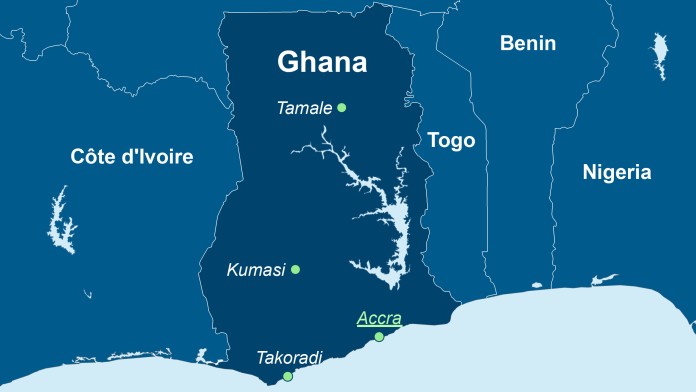
As of: 11/2022
Getting more schools by having improved district governance. This sums up how the performance-based district development fund approach works. All 261 towns and districts in Ghana are reviewed annually on how their administration and the provision of public services are performing. Districts that perform well receive additional funds from the National District Assemblies Common Fund (DACF) for investments in important infrastructure projects such as schools, health facilities or the water supply. On behalf of the German Federal Government, KfW is financing the fund together with Switzerland and the Ghanaian government.
| Project title | Project title Performance-based district development fund (DACF-RFG) |
|---|---|
| Commissioned by | Commissioned by Federal Ministry for Economic Cooperation and Development (BMZ) |
| Country/Region | Ghana |
| Project partners | Ministry for Local Government, Decentralisation and Rural Development (MLGDRD) and Office of the District Assemblies Common Fund (ODACF) |
The process of decentralisation in Ghana is progressing. Cities and districts are taking on more and more responsibility, including for local development. The aim is for the citizens of a total of 261 cities and districts (metropolitan, municipal and district assemblies) in the 16 regions of Ghana to be more involved in local decisions.
Up to now, limited financial resources for districts often prevent the implementation of important development projects. Self-generated revenues, particularly from rural districts, are very low and transfers from the central level are not sufficient. The capacity to generate their own income is usually limited.
The Ghanaian constitution does, however, guarantee districts at least five per cent of Ghana’s national revenue via the District Assemblies Common Fund (DACF). This money is needed to invest in things like schools, health facilities, rural roads, drinking water and electricity supplies, as well as in sewage and waste disposal.

On behalf of the German Federal Ministry for Economic Cooperation and Development (BMZ), KfW is financing performance-based transfers from the DACF to the districts together with the Ghanaian government and Swiss cooperation.
The DACF is tasked with distributing funds from the national level to all 260 Ghanaian regional bodies, taking into account the population, the level of poverty and the amount of self-generated revenue. The DACF also has a budget for transfers allocated to the districts according to their own efforts and performance. Those districts performing well in the annual review receive additional funds in this way for priority development projects that directly benefit the local population. The reviews consider whether districts have complied with the stipulations on good administration and the principles of good governance. This includes, for example, whether they publish annual budgets and involve citizens in their investment decisions, or how long it takes for necessary permits to be issued. The better the districts perform, the more funds they receive. The districts therefore have a clear incentive to improve their performance
and also receive funding for training and developing local resources. Training measures start in areas that were rated poorly in the performance review. People in the districts benefit from better public services and better local administration, as well as from important infrastructure projects.
Germany has contributed a total of EUR 127 million to the performance-based transfers since 2009. As a result, the DACF (and its predecessor DDF) was able to implement more than 6,000 social infrastructure projects throughout the country, including schools, healthcare facilities, water and sanitation services and roads. In addition, nearly 9,000 employees in district administrations have received basic and advanced training.
Schools are at the top of the districts’ agenda: around 40% of the investments went to the education sector. The importance of this can be seen at the Junior High School of the Nkroful Community in Sekondi-Takoradi. Around 60 pupils were being taught there in a windowless room in a multi-purpose building without any sanitary facilities. With funds from the decentralisation project, the school was able to set up two new classrooms and a teacher’s room, which also houses the administration. There are also adequate sanitation facilities. This is especially relevant for girls who would otherwise not go to school during their menstruation. More girls now attend lessons than before. “We are happy and proud to receive support for priority infrastructure projects each year. The annual review of our capacities offer us and all other districts incentives to constantly improve for the benefit of our people,” said Anthony R. Cudjoe, Mayor of Sekondi-Takoradi. “The project hasn’t only brought us money. It has also helped us to gain a new understanding of service.”
The need to improve local infrastructure in Ghana remains high. German development cooperation will therefore continue to support decentralisation in Ghana in the future.
The project contributes to the achievement of these following United Nations Sustainable Development Goals: